Up close with Chris Boardman
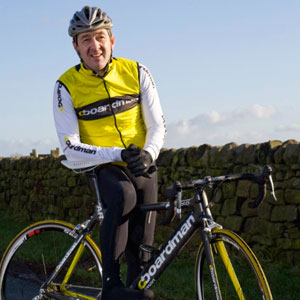
Chris Boardman is well known for his Tour de France prologue wins and the Hour record, but he retired relatively young. He is very smart and outspoken when it comes to cycling technology and he is also passionate about triathlon. We had a few words with the man nicknamed Professor.
Slowtwitch: Chris, we are glad that we can get a bit of your time.
Chris Boardman: Having scaled back my commitment with British Cycling now the Olympics is over, it’s great to have some time to get involved with other things
ST: So can you rest easier now?
Chris: Essentially, yes. We couldn’t have been happier with the results at The Games. My small team (The Secret Squirrels) delivered around 1700 pieces of clothing and equipment to the team so it was a relief when it all worked and did it is job. As great as it was, it is also a relief it is all now over!
ST: We did not even know about the secret squirrels and the clothing. How did you get involved with this?
Chris: The Secret Squirrel Club is the least secret organization on the planet – type it into Google. When I was on the Senior Management Team at British Cycling in 2004 I was asked to pull together a small group of people to look at ‘everything that wasn’t coaching or tactical and make it better by as much as possible.’ It has been an incredibly successful little group, how successful I can’t tell you but one day it will come to light. I said I would step down after London as although fascinating, it eats your entire life.
ST: Considering how busy you were in London, where were you when Alistair crossed the line as the Olympic champion?
Chris: I was watching avidly on the TV at the Broadcast centre as I was working on the cycling events for the BBC so unable to get to the venue. Jonny’s penalty certainly spiced it up!
ST: Did you give him or Jonathan any words of advice prior to the event?
Chris: I spent a day at the wind tunnel a year earlier with Alistair looking at the effects of different equipment and positional changes, some of that was implemented at The Games but close the day, I think the best thing the likes of me can do is stay out of the way, they both know their jobs well.
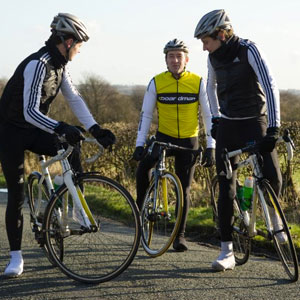
ST: Do you get nervous watching others compete (ie the Brownlee's) or is that not part of your personality?
Chris: I don’t get nervous per say, but I am always hoping and willing that they get they rewards they deserve and have worked for. I am though practical enough to know we can all only do the best that we can and after that, we wait until they have crossed the line to see if it was enough.
ST: With so many British athletes riding BTF bikes versus their standard sponsorship bikes, how did Alistair and Jonny get around that?
Chris: I guess that’s a question for the guys, I was certainly confident that the bikes were at least as good as anything else on offer and I’d say their decisions reflected they had a similar level of confidence.
ST: Can you maybe explain who decides in the end which bike is ridden?
Chris: As far as I’m concerned, the athlete is always the boss. I see us as members of their board, offering advice and council – which they can choose to accept or not. It is ultimately ‘their company’ and they choose which direction to go. This is exactly how we work with the GB cyclists, we present them with info and opportunities to explore but they ultimately choose. I like this philosophy, it keeps us all honest and performance focused.
ST: There was quite a bit of discussion in our forum about the British TT bike Wiggins rode and the aero value of said bike. We would love to hear your thoughts on that topic, or at least what you are able to say.
Chris: You are right in that I can only say a limited amount! British Cycling has a great ‘performance first’ approach and their policy gives this philosophy real teeth. Coupled to the athletes having the right to choose referred to above, the team agreement allows for an athlete to use the best equipment demonstrably available, all sponsors have to abide by this. The onus is on the sponsors/equipment providers to provide the best equipment and it is compared – either on the track, measuring power/speed or more often, in the wind tunnel – to what is available or what we can make ourselves. From there, the athlete uses the best available for the job, it’s that simple. The designer of the GB bikes (in conjunction with the GB aero team at his disposal) is Dimitris Katsanis, not coincidentally he also did the core design of my own brands TT and AiR road frames that the Brownlee’s used. It might not be to a lot of peoples taste and there may be room for improvement but it was built purely for performance, not marketing and it did the job
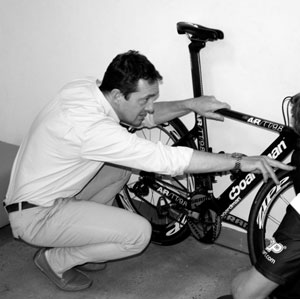
ST: One of the questions raised pointed out that there were no hidden brakes on that bike.
Chris: All of these details done properly do make a difference – but my job as program director was to balance budget, time and performance. IE I could have signed off on the creation of a set of concealed brake forks, this would impact on 1-2 medals however it would have been at the expense of making the new track cranks which would impact more on performance and effect 8 medals, so we compromised.
ST: For your own brand it appears that fewer compromises had to be made. The AiR TT9.8 for one has hidden brakes.
Chris: With my Boardman hat on, my priorities are different and it does make sense for me to put more time and resource into one set of forks that will affect thousands of performances. (see Boardman IsoSurf exposed brake – hidden brake comparison video below)
ST: How did you actually get started with the Brownlee brothers in the first place?
Chris: It was actually Alan Ingarfield, the company's co-founder and former British Ironman Champion who flagged them up, he saw them as youngsters and really just wanted to help them. It’s lovely to have started off with them as ‘young hopefuls’ and been involved with them all the way through to World and Olympic Champions. That doesn’t happen much any more.
ST: We all can kind of see how you would be in a good position with these two British athletes, but how did the connection to Pete Jacobs come up?
Chris: Alan has always been first and foremost a fan of triathlon, business decisions are made on this not despite of it. In recent years my enthusiasm for the sport has grow to match his, it is exciting to be involved with something seemingly similar but subtly different. When we started to sell bikes in Australia, we needed to let the Australian public see the product. Again, Alan spotted Pete’s potential before he finished 2nd in Hawaii and again, he was right. Pete and the Brownlees are more than just sponsored athletes though, they are and will be the first to get prototype product to test and their feedback will genuinely influence the design of the final product. In fact, the next TT bike we are working on, we have pictures of Pete’s exact set up and the CAD was overlaid to ensure the first test product is exactly his size.
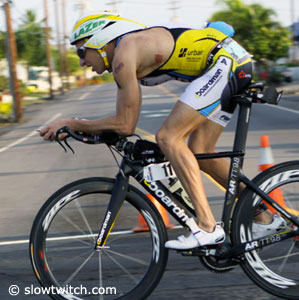
ST: So will we see something new under him soon?
Chris: Short answer is yes, but not for the 2012 World Championships. We give ourselves a deadline of 2 months before to have proven production prototypes with the athletes after that we won’t risk their performance with changes too close the event. Performance first, not marketing.
ST: Where do you think Pete will end up this time?
Chris: Alan ‘has a good feeling’ about Pete this year and as he’s been right every time so far … I’m going with his gut!
ST: Will we see you in Kona this year?
Chris: I’d love to be in Kona and will be next year but sadly due to another commitment I can’t make it. I was truly gutted as it would have been great to be able to ride the bike in a place I’ve never been, watch the racing and do some scuba diving, my other big passion.
ST: Would you ever consider doing an Ironman, be it in Hawaii or elsewhere?
Chris: I originally intended to end my cycling career at 32 so I could try triathlon. In the intervening years, life got in the way with things like an ankle broken in 6 places during the Tour de France making serious running a non-starter. I can’t complain though, such ‘life scars’ are the result having lived and pushed the limits.
ST: We hear you there. Anything else we should know?
Chris: Lots but I can’t tell you.
Boardman Bikes IsoSurf comparison

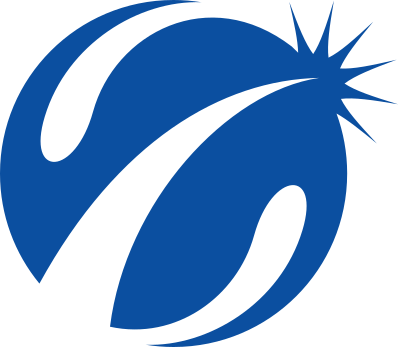

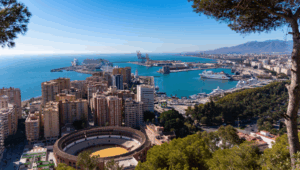
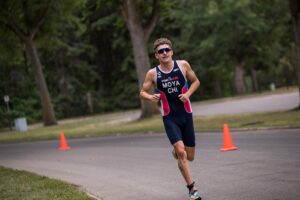


Start the discussion at forum.slowtwitch.com